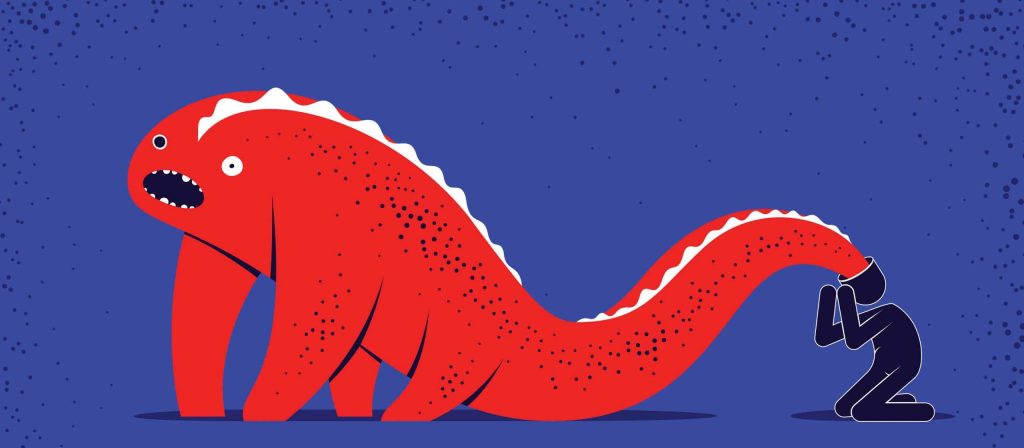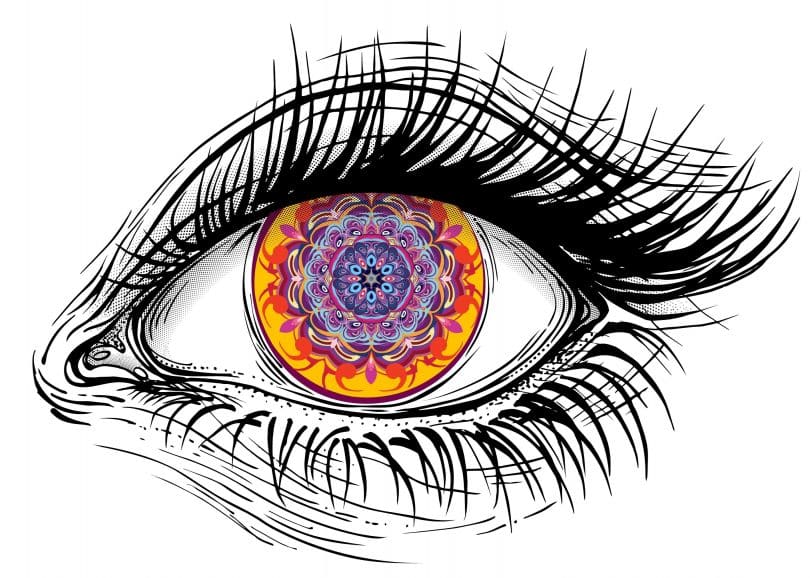Right now we’re in a changing time in which things that were banned for decades and looked down on, are now gaining positive attention in the public eye. From cannabis to ketamine to magic mushrooms, the conversation has changed from trying to bar these drugs, to figuring out the best way to use them. But it can get confusing in terms of what we’re talking about sometimes, particularly when it comes to psychedelics. Are all psychedelics hallucinogens, and all hallucinogens psychedelics? Read on to find out more.
How we simplify things
Before getting into distinctions between the terms ‘psychedelics’ and ‘hallucinogens’, let’s first think a little bit about how terms and ideas in life, often get simplified, or changed through misunderstanding. Let’s be honest, we’re not all professionals in every category. So when a news story gets big in life, its presented in a way that promotes a general understanding in the general public; even if this means watering it down, or even changing definitions a bit.
One that stands out to me, is the term ‘AI’, and how it took the place of the term ‘pattern matching’. Artificial intelligence involves a machine being able to take information, and put it together to draw its own conclusion; something not previously presented to it, and something not based on a formula. The idea of this mirrors human intelligence, but is not the same thing. And while the internet is spinning with confusion, leading to articles like this claiming the definition is changing, or different to different people; this isn’t true. But it is an example of how the masses misunderstand information, and create new avenues based on misunderstandings.
It doesn’t matter if AI mimics a human brain, or if it includes machine learning or deep learning, or anything else; those aren’t definitions. They’re components. The definition is what it does, which is draw conclusions on its own, no matter how it gets there. I understand this point from working with AI chatbots before the boom of the last few years. And it wasn’t confusing until the general public got ahold of it.
Hey, great to have you here. We provide the Cannadelics Weekly Newsletter for direct updates, and to get you great deals on cannabis flowers, vapes & smoking equipment, edibles, cannabinoid extracts (including delta-8), amanita mushroom products, and too much more to name. Let’s all feel good together!
What most ‘AI’ refers to, is ‘pattern matching’; a term that alludes to a system that assigns a meaning to something, and then finds answers that match up to that meaning, following a preset formula. Think of the chatbots we deal with as customer service support. They’re pretty limited and can’t have a conversation because they can’t actually think for themselves. But they can take your question, and match it to a preset answer. This concept is used a lot in medical diagnosis, like identifying cancer by finding an irregular cell, which breaks a pattern.
That’s all fine and good, but that idea of matching patterns, (which exist in all different contexts), isn’t artificial intelligence. And that would be all fine and good, it we weren’t told that it is. In an effort to make a complicated idea understandable, the parameters that define AI are ignored in light of making a more digestible answer for the masses.
Is it a problem? Maybe, maybe not. Think about the term ‘climate change.’ No, this isn’t a debate about whether it exists or not, its just bringing up the idea that that one term is actually a much watered down version of the real issue. ‘Climate change’ makes people think of icebergs melting and polar bears without homes. But it doesn’t make people think about their own health necessarily.
The idea of climate change, is massively tied to the idea of breathable air; but that latter idea, is often left out in a simplification that doesn’t help people understand how pollution affects human health. Perhaps some of those waging wars to not care about pollutants released, aren’t thinking about the growing number of asthma and bronchitis problems that exist, or the cancers related to breathing in toxic chemicals. It’s not for me to say that we do or don’t affect the climate, but we do affect our own health with these decisions, and that is so often left out of the simplified argument.
Are All Hallucinogens, Psychedelics?
We just established that terms are often confused and ideas simplified, in order to make them understandable to a public, which isn’t an expert in everything. So, how does this idea apply to the question of whether all hallucinogens are psychedelics? Because in this new age of drug acceptance, the term ‘psychedelics’ is taking on more than it actually means.
Think of ketamine. With the whole idea of psychedelic therapy on the rise, ketamine has entered the game in a big way. Only thing about it? Ketamine isn’t a psychedelic. Even so, you’ll see it called that, even on sites providing ketamine services. It’s not meant to be confusing either, its actually meant to help people understand, without bogging them down with complicated categorical terms. But the reality is that ketamine isn’t a psychedelic, it’s a dissociative hallucinogen.

The term ‘psychedelics’ refers to only four compounds: DMT, psilocybin, mescaline, and LSD. Though they all work a little differently, they have in common that they’re all agonists at serotonin receptors, specifically 5-HT2A. They’re classified this way based on their mode of action. Is ketamine a serotonergic drug? No, it’s not. Dissociative hallucinogens, a classing which includes DXM and PCP, act way more on dopamine receptors, and NMDA receptors, though they each have their own specifics of action.
What ketamine is considered, and which is stated in its class name, is that it’s a hallucinogen. What this shows us is that ketamine is a hallucinogen, without being a psychedelic; which in turn means, no, not all hallucinogens are classed as psychedelics. In fact, the four that do count as psychedelics, are often called ‘classical psychedelics,’ which is a term meant to reclassify the ones that go together, amid a growing misunderstanding of what it actually means to be a psychedelic.
What’s a hallucinogen?
That brings us to the question of how to define hallucinogens. Essentially, they incorporate many different kinds of drugs, which all have in common the ability to produce an altered state of mind. This can include big changes in mood; thinking; and the perception of the world around, and oneself. A hallucination, after all, is an experience of something that isn’t real, or is changed in our perception of it. This can include seeing, hearing, feeling, smelling, or tasting something that isn’t there, or experiencing something differently from how it should be.
The general classification structure dictates that there are three types of hallucinogens, and classes them as psychedelics (DMT, LSD, psilocybin, mescaline), dissociatives (ketamine, DXM, PCP), and deliriants (datura, Benadryl). The last grouping has major action on the neurotransmitter acetylcholine, which is what defines the mode of action of that group.
This leaves a lot of stuff out though, and it becomes clear that hallucinogens exist in other places as well. Like Amanita muscaria mushrooms, which are under the genus of ‘poisonous mushrooms’ with no mention of being a hallucinogen in the genus name, though they are known to produce hallucinations, and have great effect on GABA receptors. And what of MDMA and 2C-B which people like to stick in the psychedelics group? Actually, they’re considered psychostimulants and phenethylamines, but they too, cause hallucinations.
And then there’s salvia. It’s a member of the Lamiaceae mint family, without any further taxonomical classing for its hallucinogenic properties. Salvia has the distinguishing factor of being the only hallucinogen that’s a diterpene, meaning it has structural components similar to compounds we often talk about in conjunction with weed; though it involves different ones. Its mode of action isn’t entirely flushed out, but it doesn’t effect 5-HT2A receptors, and does seem to work at (κ) kappa-opioid receptors and D2 (dopamine) receptors. While it is most definitely a hallucinogen, it’s not a psychedelic.

What we can then get out of this, is that while not all hallucinogens are psychedelics, all psychedelics are hallucinogens; as well as many other drugs that aren’t psychedelics. And that ‘hallucinogens’ is not specific to any one particular kind of drug, but is relevant to any psychoactive drug that produces perception-altering effects.
Does it matter?
I had a conversation on a message board with a woman who had posted about making an Amanita muscaria oil by putting the mushrooms in almond oil. What she didn’t understand, is that this won’t create an Amanita muscaria oil, because it can’t. Fundamentally. The compounds in the mushrooms (ibotenic acid and muscimol) are water soluble, not oil soluble; so they won’t leach out into an oil.
The woman would accept no other answer than that she had made the oil she thought she did, despite it not being possible. And every attempt to get her to examine the chemistry, or to simply ask the internet if it was possible (which would have gotten her to the right answer in not too much time), was deflected in favor of backing up her argument. What she did show, is that the placebo effect is very strong, (or that almond oil really does have pain-relieving benefits – that’s what the oil was for).
The thing is, even with me and other people pointing out the chemical properties of the mushrooms (complete with documentation), this person not only didn’t want to listen to anything, she wanted to keep repeating herself. She even mentioned in the post I saw, that a previous post had netted similar responses to the one I gave, yet she never thought to look it up, and try to understand. And continued to post about it.
What this woman exemplifies to me, is how difficult these subjects are, and how hard they are to understand. No disrespect on any of it. I tend to think its best to investigate, especially when repeatedly running up against the same wall; but I have to relent enough to understand that not everyone has the background or research ability, to do so. Still no disrespect. Because we all do this on the subjects we’re unfamiliar with, and we can all hold tight to what we think we know at times. Often past the point we should without further investigation.
Things are simplified because it’s not expected that everyone will, or can, understand a given topic. And that’s fair. If you launch into something about astrophysics, I’m going to get bleary eyed and lose you pretty fast. And I might make misstatements before learning correctly. I do hope that woman eventually looks things up, and attempts to understand the thing she was trying so hard not to understand. But the reality is that with things watered down so profusely in an effort to make subjects more generalizable, this happens all the time.
Conclusion
It’s up to you whether this matters or not. Pretty much every chatbot is called AI, and the climate change debate may never incorporate the issue of breathable air; and maybe its not important. However, the woman trying to make the oil shines a light on why this practice of trying to make things easier to understand, can institute incorrect ideas, and get in the way of progress. Personally, I think it’s important to keep information clear, so that the oil comes out right. But that’s just my opinion.
Hello everyone! Thanks for joining in at Cannadelics.com; an independent news source which focuses on reporting of the growing cannabis and psychedelics landscapes. Come ’round regularly to stay up on current events; and subscribe to our Cannadelics Weekly Newsletter, to ensure you never miss a single thing.







